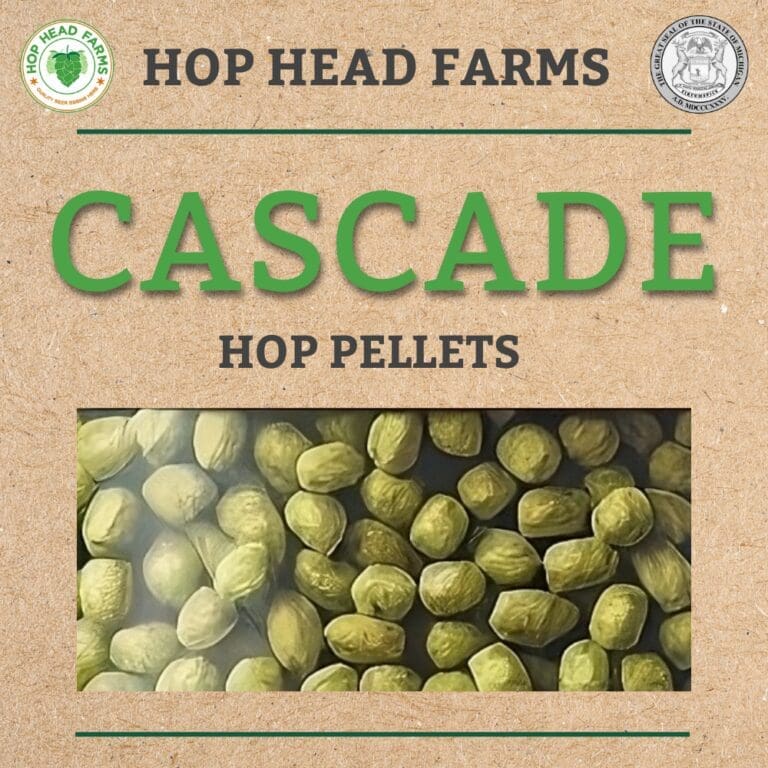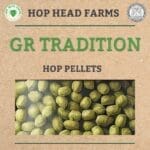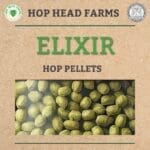Cascade hops have long held their place as one of the most iconic hop varieties in the world of brewing. Originating in the USA and with a rich history dating back to its development in the 1960s, Cascade hops have become synonymous with American Pale Ales and are celebrated for their distinctive flavor and aroma. Known for imparting tropical fruit and citrus notes, Cascade hops are often featured in amber ales. In this article, we’ll take a closer look at Cascade hops, tracing their origin, flavor profile, and significance in the world of brewing. Additionally, for those wondering “What does hops look like,” Cascade hops appear as small, green, cone-shaped flowers, resembling pine cones, similar to other planted hop varieties.
Origin
Cascade hop owes its existence to the dedicated efforts of the USDA breeding program at Oregon State University. In 1972, they were introduced to the public, marking the beginning of their journey towards hop stardom. However, their story began years earlier, with a unique parentage that contributes to their exceptional qualities.
Cascade hops, often used as IPA hops, were born from a cross between the English hop variety Fuggle and the Russian hop Serebrianka, a union that would forever change the landscape of beer flavor. This innovative combination gave birth to Cascade, initially known only by its numerical designation, USDA 56013. Cascade is now frequently utilized in dry hop techniques to amplify aroma and flavor, contributing to the creation of great beer.
A Global Phenomenon
While Cascade hops are often associated with their American roots, they have transcended borders to become a global sensation. Today, you can find Cascade hops flourishing in New Zealand, Argentina, and Australia, where the famous Nelson Sauvin hop variety adds a tropical fruit twist to many beers. Each region adds its own unique twist to the hop’s character. In fact, Cascade hops are now used by several renowned hop farm brewing companies, experimenting with these hops in various beer styles like the famous Hop Farm IPA.
In the United States, the hop harvest for Cascade typically begins in mid-to-late August, making it a key event for brewers eager to harness its flavors, especially for amber ales and tropical fruit-forward beer styles.
The Flavorful Symphony of Cascade Hops
Cascade hops are versatile players in the brewing process, equally adept at various stages, from bittering to aroma additions. However, it’s their captivating flavor and aroma that have truly set them apart.
Citrus Sensation: Cascade hops are renowned for their citrusy notes, with a particular emphasis on the bright and zesty flavors of grapefruit. This citrus sensation has made Cascade a standout choice for brewers seeking to infuse their beers with a burst of freshness.
Floral Complexity: Beyond the citrus, Cascade hops bring a medium-intense floral quality to the table. This delicate floral touch adds depth and complexity to the hop’s overall profile, making it a favorite among those who appreciate nuanced flavors.
Spice and More: Cascade hops introduce a subtle spicy citrus sensation that rounds out the flavor profile. This touch of spice enhances the overall drinking experience, making it an intriguing choice for a wide range of beer styles.
Cascade Hops in Brewing
Cascade hops have left an indelible mark on the world of brewing, particularly in the realm of American Pale Ales. They are often hailed as the hops that made hops famous, with their role in Sierra Nevada’s Pale Ale earning them a special place in beer history (https://hopheadfarms.com/beer-hops/).
When used as a bittering hop, Cascade imparts moderate bitterness to the brew, with alpha acid content typically ranging between 4.5% and 7%. However, it is most famous for its role as the finishing hop, contributing its unique flavor and aroma to the final product. This contribution is widely recognized as the spark that ignited the IPA and bitter beer craze. Cascade also answers the question of “What hops” should be chosen for their balanced, citrus-forward character in various beer styles.
Hop Companions
Cascade hops are known for their versatility and are often paired with other hop varieties to create exciting flavor profiles. Common hop companions for Cascade include Centennial, Chinook, Simcoe, Columbus, Citra, and Mosaic. These pairings result in a symphony of hop flavors that can elevate a beer to new heights.
A Cascade of Beer Styles
Cascade hops find themselves at home in a variety of beer styles. Some popular choices include American Ale, IPA, Porter, Barleywine, Witbier, Pale Ale, and American Pale Ales. Their adaptability and distinct character make them a valuable ingredient for brewers looking to craft a wide range of beer experiences.
Cascade hops are also sometimes featured as the sole hop variety in beers, allowing their unique flavors and aromas to take center stage. Whether used as fresh leaf hops or in pellet form, Cascade’s influence on the beer world is undeniable.
Exploring Cascade Hop Substitutes
While Cascade hops are beloved by many, availability can sometimes be a challenge. If you find yourself in need of a substitute, fear not, as several hops share similarities with Cascade:
- Amarillo
- Centennial
- Ahtanum
- Summit
These hop varieties can step in to provide a similar flavor profile, ensuring that your brew retains the essence of Cascade hops even when the real deal is scarce.
Cascade Hops in Homebrewing
Cascade hops have made a significant impact on the homebrewing scene. Their availability in pellet form and rhizomes for cultivation has empowered homebrewers to experiment with these iconic hops. Homebrewers can craft their own interpretations of Cascade-focused beers, tweak recipes to emphasize specific flavor aspects, and even create unique Cascade hop blends tailored to their preferences. The ease of use and distinctive flavors of Cascade hops make them a beloved choice among home brewing enthusiasts.
Cascade Hops and Sustainability
In an era when sustainable brewing practices are gaining importance, Cascade hops have stood out as a sustainable choice for both commercial and home brewing. Their adaptability to various climates reduces the need for excessive pesticide use and water resources. Additionally, Cascade hops’ vigorous growth and relatively high yield potential contribute to more efficient land usage, further aligning with sustainable agricultural practices. Brewers committed to environmental stewardship often turn to Cascade hops as a sustainable ingredient for their beers.
Conclusion
Cascade hops have carved out a special place in the hearts of brewers and beer enthusiasts alike. Their journey from the breeding programs of Oregon State University to becoming an international sensation is a testament to their enduring appeal. With their citrusy, floral, and spicy notes, Cascade hops continue to be a driving force in the world of craft brewing, allowing brewers to create memorable beers that delight the palate.
So, whether you’re a seasoned brewer or a beer enthusiast exploring new flavors, Cascade hops are sure to offer a hoppy adventure worth savoring. For more information on El Dorado Hops, visit Hop Head Farms.






